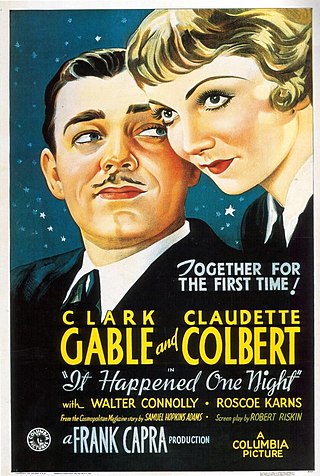
It Happened One Night is a 1934 pre-Code American romantic comedy film with elements of screwball comedy directed and co-produced by Frank Capra, in collaboration with Harry Cohn, in which a pampered socialite tries to get out from under her father's thumb and falls in love with a roguish reporter. The screenplay by Robert Riskin is based on the August 1933 short story "Night Bus" by Samuel Hopkins Adams, which provided the shooting title. Classified as a "pre-Code" production, the film is among the last romantic comedies created before the MPPDA began rigidly enforcing the 1930 Motion Picture Production Code in July 1934. It Happened One Night was released just four months prior to that enforcement.
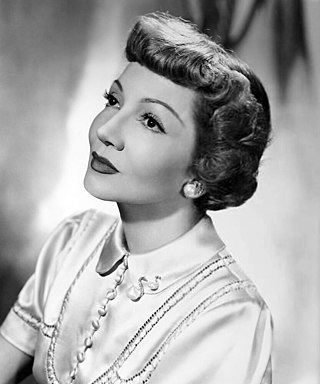
Émilie Chauchoin, professionally known as Claudette Colbert, was an American actress. Colbert began her career in Broadway productions during the late 1920s and progressed to films with the advent of talking pictures. Initially contracted to Paramount Pictures, Colbert became one of the few major actresses of the period who worked freelance, independent of the studio system.

The Big Pond is a 1930 American pre-Code romantic comedy film based on a 1928 play of the same name by George Middleton and A.E. Thomas. The film was written by Garrett Fort, Robert Presnell Sr. and Preston Sturges, who provided the dialogue in his first Hollywood assignment, and was directed by Hobart Henley. The film stars Maurice Chevalier and Claudette Colbert, and features George Barbier, Marion Ballou, and Andrée Corday, and was released by Paramount Pictures.

Midnight is a 1939 American screwball comedy film directed by Mitchell Leisen and starring Claudette Colbert, Don Ameche, John Barrymore, Francis Lederer, Mary Astor, and Elaine Barrie. Written by Charles Brackett and Billy Wilder and based on a story by Edwin Justus Mayer and Franz Schulz, the film is about an unemployed American showgirl stranded in Paris who is set up by a millionaire to break up his wife's affair with another man. In 2013, the film was selected for preservation in the United States National Film Registry by the Library of Congress as being "culturally, historically, or aesthetically significant".

Nocturne is a 1946 American film noir directed by Edwin L. Marin and starring George Raft, Lynn Bari and Virginia Huston. The film was produced by longtime Alfred Hitchcock associate Joan Harrison, scripted by Jonathan Latimer, and released by RKO Pictures. It was one of several medium budget thrillers Raft made in the late 1940s.
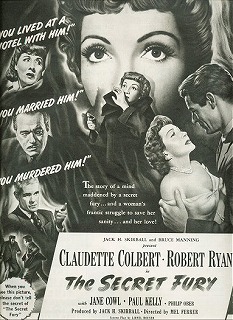
The Secret Fury is a 1950 American noirish psychological thriller starring Claudette Colbert and Robert Ryan. Directed by Mel Ferrer for RKO Radio Pictures, it also featured a rare screen appearance of Broadway legend Jane Cowl, with Paul Kelly also in support.

Vivian Alamain is a fictional character from Days of Our Lives, an American soap opera on the NBC network. Created by head writers Richard J. Allen and Beth Milstein, and introduced by executive producers Ken Corday and Al Rabin, the role is most recognized as portrayed by actress Louise Sorel. In addition to Sorel, the role has subsequently been portrayed by Marj Dusay, Robin Strasser and Linda Dano.
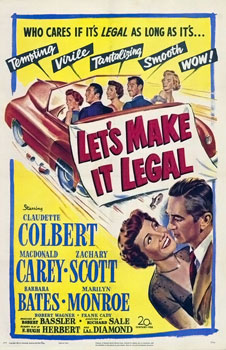
Let's Make It Legal is a 1951 American comedy film made by 20th Century-Fox, directed by Richard Sale and produced by Robert Bassler from a screenplay by I.A.L. Diamond and F. Hugh Herbert, based on a story by Mortimer Braus entitled "My Mother-in-Law, Miriam". The music was by Cyril J. Mockridge and the cinematography by Lucien Ballard.
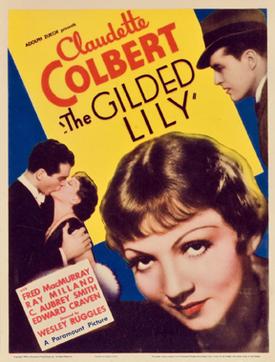
The Gilded Lily is a 1935 American romantic comedy film directed by Wesley Ruggles and starring Claudette Colbert, Fred MacMurray, Ray Milland, and C. Aubrey Smith. The production's screenplay, written by Claude Binyon, is about a stenographer who becomes a famous café entertainer courted by an English aristocrat and an American newspaper reporter. Released by Paramount Pictures in the United States on January 25, 1935, the film is one of the English language films chosen by the National Board of Review for its top-10 list of 1935. The Gilded Lily is also the first of seven films in which Claudette Colbert and Fred MacMurray costar.
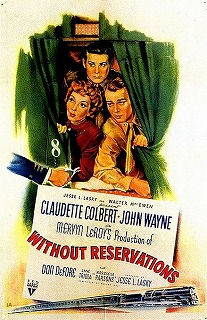
Without Reservations is a 1946 RKO Radio Pictures American comedy film directed by Mervyn LeRoy and starring Claudette Colbert, John Wayne and Don DeFore. The film was adapted by Andrew Solt from the novel Thanks, God! I'll Take It From Here by Jane Allen and Mae Livingston.

Sleep, My Love is a 1948 American noir film directed by Douglas Sirk. It features Claudette Colbert, Robert Cummings and Don Ameche.

The Planter's Wife is a 1952 British war drama film directed by Ken Annakin, and starring Claudette Colbert, Jack Hawkins and Anthony Steel. It is set against the backdrop of the Malayan Emergency and focuses on a rubber planter and his neighbours who are fending off a campaign of sustained attacks by Communist insurgents while also struggling to save their marriage.
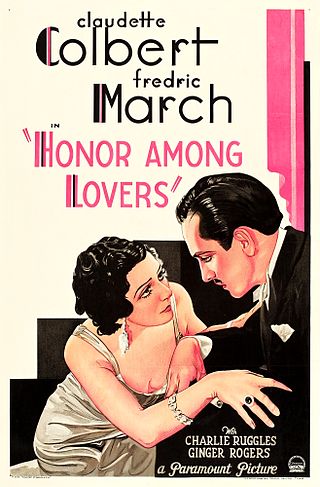
Honor Among Lovers is a 1931 American pre-Code drama film made by Paramount Pictures, directed by Dorothy Arzner. The film stars Claudette Colbert, Fredric March, Monroe Owsley, Charles Ruggles and Ginger Rogers. The film was originally titled Sex in Business.
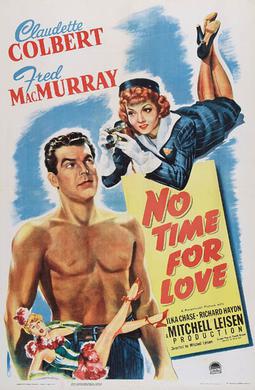
No Time for Love is a 1943 American romantic comedy film produced and directed by Mitchell Leisen and starring Claudette Colbert and Fred MacMurray. Written by Claude Binyon, Robert Lees, and Frederic I. Rinaldo, the film is about a sophisticated female photographer assigned to photograph the tough "sandhog" construction workers at a tunnel project site. After saving one of the sandhogs from a fatal accident, she becomes attracted to this cocky well-built man they call Superman. Unsettled by her feelings, she hires the man as her assistant, believing that her attraction to him will diminish if she spends time with him. Their time together, however, leads to feelings of love, and she struggles to overcome her haughtiness and make her true feelings known.

Family Honeymoon is a 1949 American domestic comedy film made by Universal International, directed by Claude Binyon, and written by Dane Lussier, based on the novel by Homer Croy. It was shot in Grand Canyon National Park, Arizona.

Robert Edward Homans was an American actor who entered films in 1923 after a lengthy stage career.

Double Confession is a 1950 British crime film directed by Ken Annakin and starring Derek Farr, Joan Hopkins, William Hartnell and Peter Lorre. The screenplay by William Templeton is based on the novel All On A Summer's Day by H.L.V. Fletcher, written under the pen name John Garden.
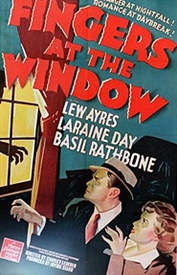
Fingers at the Window is a 1942 mystery film directed by Charles Lederer and released by Metro-Goldwyn-Mayer.
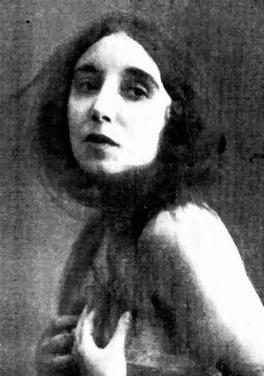
Norine Fournier Lattimore, known as Dolores, was an artists' model who was a fixture on London's bohemian scene between the First and Second World Wars. She posed for Jacob Epstein, for whom she played the role of "the High Priestess of Beauty" and who called her "the Phryne of modern times". The Hearst Press in America, who sensationally serialised her life story, called her The "Fatal Woman' of the London Studios". She was a contemporary of Betty May, Euphemia Lamb and Lilian Shelley.



















